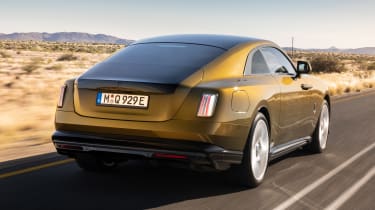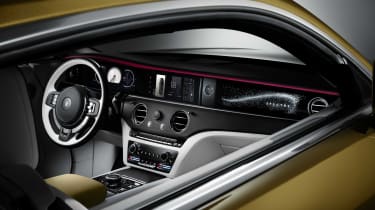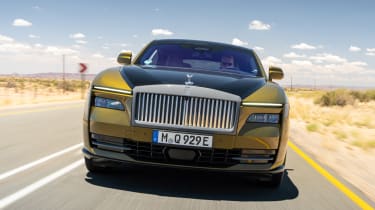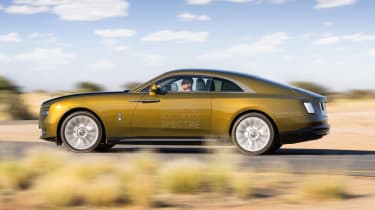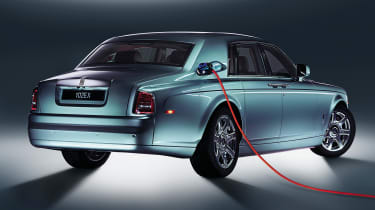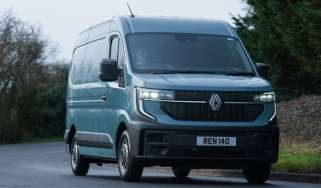New Rolls-Royce Spectre luxury electric car: range, specs, price and prototype review
We’ve driven a prototype of the first-ever electric Rolls-Royce, which is expected to cost more than £300,000
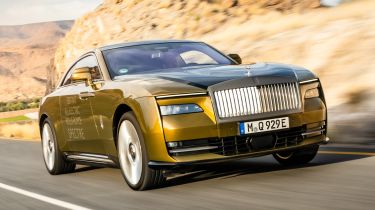
The all-new Rolls-Royce Spectre: a car its makers hope will successfully transition the British brand into the electric age. The world’s first “ultra-luxury electric super coupé” and a “spiritual successor to the Phantom Coupé”, the Spectre is a sleek, two-door EV that’ll arrive in 2023 and could cost more than £300,000.
Rolls-Royce says the Spectre’s all-electric powertrain “will only enhance the Rolls-Royce experience” – the car’s instant torque, silent running and single-gear have “defined the characteristics of an extraordinary canon of product” dating back to 1904, according to the British car manufacturer.
Visually, the Spectre’s design is a clear evolution of the now-discontinued Wraith coupe, with a tidier front end, and split headlights with slim LED daytime running lights. The distinctive Pantheon grille is wider than ever, and helps direct air flow around the front of the car. The iconic Spirit of Ecstasy bonnet ornament has also been updated for the Spectre to be more aerodynamic.
Aerodynamics plays a big part in the Spectre’s design, in fact; a drag coefficient of 0.25cd makes this the slipperiest Rolls-Royce ever. It’s also 30% stiffer than any model that has gone before it.
In profile, you’ll notice the Spectre’s 23-inch wheels – the largest on any Rolls ever – as well as the high beltline and long, sweeping roofline. The car in these images shows a two-tone bootlid, with the dark rear screen matching the contrasting black roof.
At 5,453mm long and weighing in at 2,975kg, the Spectre is longer and heavier than the company’s Cullinan SUV. Though, four-wheel steering helps reduce the Spectre’s turning circle to just 12.7 metres – slightly more than a Jaguar I-Pace.
The Spectre’s powertrain produces 576bhp and 900Nm of torque in all, which allows it to hit 62mph in 4.5 seconds. Rolls-Royce hasn’t revealed how big the battery is, but we're told it's the biggest unit from within the BMW Group – currently the BMW iX M60’s 111.5kWh battery – with Rolls-Royce claiming the Spectre will be able to cover 323 miles on a charge.
We expect the Spectre’s maximum charging rate will match the 195kW of the BMW i7 and iX, so a 10-80% charge should take around 35 minutes. The company doesn’t anticipate Spectre owners will rely much on public charging networks however, and so has decided to offer a bespoke wallbox solution for owners instead.
Opening the Rolls-Royce’s rear-hinged coach doors reveals a four-seat interior with what the maker claims features the “most technologically advanced Bespoke features yet”. The optional Starlight doors incorporate 5,876 softly illuminated stars; owners can specify another 5,500 on the dashboard, plus more in the roof. “As with all Rolls-Royce motor cars, Spectre’s interior suite offers clients near-infinite Bespoke possibilities” the company says.
The fully-digital dashboard features the very latest infotainment technology and “digital architecture” that Rolls-Royce has dubbed SPIRIT. It controls all of the car’s main functions, and even the Spectre’s ‘Whispers’ smartphone app which gives the user access to things like cabin conditioning and charging information.
Rolls-Royce has confirmed that by 2030 its entire range will be fully electric, with CEO Torsten Müller-Ötvös commenting: “Spectre’s all-electric powertrain will assure the marque’s sustained success and relevance while dramatically increasing the definition of each characteristic that makes a Rolls-Royce a Rolls-Royce.”
The Spectre will be built at the company’s factory in Goodwood, UK. Production is due to start later this year, with the first cars due to roll off the line in Q4 2023.
Rolls-Royce Spectre prototype drive
Rolls-Royce’s electric super coupe will have covered more than 1.5 million miles in development testing before the first examples are delivered to their lucky new owners later this year. The Spectre was roughly 60% complete at the time we got behind the wheel for the first time, but this prototype should provide a great idea of what to expect from the production-ready model.
Once you’re sitting comfortably in the driver’s seat, rather than pressing a button or stretching to try and close the huge, rear-hinged doors yourself, you simply put your foot on the brake and the door swings shut.
The Spectre is as silent as an EV gets on the road, with the motors not even producing so much as a whine, whistle or faint hum. Even when cruising along at around 70mph, it’s deathly silent inside. Refinement really is that incredible. The battery pack actually helps in this department, as the firm says it acts as “almost 700kg of sound deadening”.
Yet, Rolls-Royce being Rolls-Royce, it thinks there's still a few tweaks to be made to improve it. More specifically, it’s looking to tighten up tolerances on panel gaps and door seals with the goal of reducing wind noise. Even the climate control is being scrutinised because the blower's gentle woosh is apparently too loud.
The Spectre is laser-focused on comfort and “waftability”, like all the best luxury cars. So despite the generous 576bhp on tap, the controls have been calibrated so you won’t find any whiplash-inducing acceleration here. Performance is much more proportional to the amount of throttle travel, so when you sink your right foot into the deep, soft carpet, there's a huge swell of torque to whisk you forward serenely.
The brakes are simple and progressive, too. There are two modes for the regenerative system: standard and a stronger B mode, but the latter certainly isn’t an aggressive one-pedal driving system. What's nice is that a well-judged push of the brake slows the car gently, allowing you to bring the nearly three-tonne behemoth to a stop with a soft rock on its springs, rather than a jolt.
With the majority of the Sceptre’s heft located as low as possible in the chassis, lowering the centre of gravity, the Spectre feels taut through most direction changes. Combined with lightweight but surprisingly direct steering, this makes the car feel more nimble than you expect. Higher speed manoeuvres and bends do feel like they’re testing it a little more, but we doubt many Spectre owners will be driving theirs in a similar manner.
As we said, comfort is the much bigger priority, and we found the Spectre’s ride to be genuinely soothing. Over rolling undulations and even smoother bumps, the Spectre feels supremely supple and yet still controlled. We’re told there’s a little work to be done on the damping when encountering harsher imperfections at higher speed; it was somewhat noticeable on our prototype’s optional 23-inch wheels, though not an obvious flaw.
Because Rolls-Royce says there is still work to be done, we’ll reserve final judgement until the British brand has polished and refined its first EV to within an inch of its life. But even at this stage, refinement is unbelievable, the ride comfort is exceptional and performance is still more than amble for what we'd expect of an electric car or a Rolls-Royce. Perhaps the bigger surprise is how enjoyable the Spectre is to drive and the confidence it inspires when behind the wheel.
Rolls-Royce’s history with EVs
Rolls-Royce has some form when it comes to battery-electric vehicles (BEVs), given the company founders' passion for electric cars. Sir Henry Royce supposedly considered fitting an electric powertrain in its first cars – although elected not to due to range and charging issues at the time. Charles Rolls acknowledged the advantages of an electric powertrain in 1900, saying: “The electric car is perfectly noiseless and clean. There is no smell or vibration, and they should become very useful when fixed charging stations can be arranged.”
In addition, Rolls-Royce has dipped a toe in these waters before: 10 years ago, the brand took the wraps off the 102EX (pictured above), also known as the Phantom EE (Experimental Electric): a prototype zero-emissions version of what was then its flagship limousine.
In place of the 6.75-litre V12 found in the petrol-powered Phantom at the time was a 71kWh battery and two electric motors powering the rear wheels, producing 389bhp and 800Nm of torque. But while the electric Phantom prototype was an impressive concept at a time when many brands were yet to jump on the EV bandwagon, it could only cover 124 miles on a charge and the battery had a lifespan of just three years.
Recommended

EV Deal of the Day: Dacia Spring is amazingly good value at £116 per month

EV Deal of the Day: budget-friendly Ford Capri for just £234 a month
Most Popular

EV Deal of the Day: budget-friendly Ford Capri for just £234 a month
